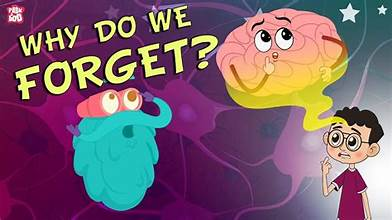Trying to recall a forgotten name or fact is a common human experience.
Have you ever walked into a room, only to completely forget why you went there? Or maybe you met someone new and their name vanished from your mind moments later. Forgetting your keys, an appointment, or a simple detail is a common frustration. It can make you feel a bit anxious, wondering if your memory is slipping. Yet, these minor memory lapses are a regular part of life for many people.
Memory is a core part of being human. It lets us learn, grow, and build our personal story. But memory isn’t perfect. It works through three main steps: encoding (getting information in), storage (keeping it), and retrieval (getting it back out). Forgetting often happens when there’s a problem at any of these stages. It’s not always about losing data; sometimes, you can’t find it.
This article will look at the real science behind why we forget. We will explore how our excellent memory system works and why it sometimes lets us down. By understanding these reasons, you can gain insights into your brain and help your memory work better.
The Brain’s Memory Systems: How We Remember
Your brain is a complex machine, and memory is one of its most impressive feats. Different parts of the brain work together to form, store, and recall memories. This network makes memory possible.
The Biological Basis of Memory
Memory isn’t magic. It has a physical basis in your brain’s structure. Specialized cells and connections form the foundation for all you remember.
Neurons and Synapses: The Building Blocks
Your brain is made of billions of nerve cells called neurons. These neurons talk to each other across tiny gaps called synapses. When you learn something new, these connections get stronger. This process is known as long-term potentiation. Think of it like a path in the woods; the more you walk it, the clearer and easier it becomes to follow. This strengthening of neural paths is how memories are physically made.
Key Brain Regions Involved
Several brain areas are vital for memory. The hippocampus, shaped like a seahorse, is crucial for forming new memories about facts and events. It’s like a temporary holding spot before memories move to long-term storage. The amygdala handles emotional memories, which is why strong feelings can make memories stick. Lastly, the prefrontal cortex helps with working memory, letting you hold information in mind just long enough to use it. Each area plays a key part in different memory types.
Types of Memory and Their Vulnerabilities
Not all memories are created equal. Your brain stores different kinds of information in various ways. This also means some memories are more likely to be lost than others.
Short-Term vs. Long-Term Memory
Short-term memory holds a small amount of information for a brief time. Imagine trying to remember a new phone number before you dial it; that’s short-term memory at work. It has a limited capacity and duration. Long-term memory, however, can hold a vast amount of information for a lifetime. With enough repetition and focus, info from short-term memory can move into your long-term storage.
Explicit vs. Implicit Memory
Explicit memory is about facts and events you can consciously recall. This includes things like knowing the capital of France or remembering what you ate for breakfast. It’s also called declarative memory. Implicit memory is automatic and unconscious. It covers skills, habits, and learned responses, like how to ride a bike or tie your shoelaces. These types of memories are handled and stored in separate parts of the brain.
Common Reasons for Forgetting: The Science of Ebbing
Forgetting is not just about a memory disappearing. Often, it’s about the way memories interact or how they are stored and accessed. Science helps us understand these everyday lapses.
Interference: When Memories Collide
Sometimes, new information or old information can get in the way of recalling what you need. This is called interference. It’s like trying to listen to two radio stations at once; the signals get muddled.
Proactive Interference
This happens when old memories make it hard to recall new ones. For example, if you change your email password, you might keep typing the old one out of habit. The old, strong memory prevents you from easily remembering the new detail. It’s a common reason for mix-ups.
Retroactive Interference
The opposite can also happen. Retroactive interference means new information makes it more challenging to remember old things. If you learn a new street name in your neighborhood, you might suddenly struggle to recall the old street name you used to know. The fresh details effectively push older ones aside, making them harder to access.
Retrieval Failure: The Tip-of-the-Tongue Phenomenon
Have you ever felt like a word or name is “on the tip of your tongue”? You know it’s there, but you just can’t pull it out. This is a classic example of retrieval failure. The memory is stored, but it’s temporarily inaccessible.
Lack of Retrieval Cues
Memories are often linked to specific cues or contexts. If you learned something in a quiet room, you might recall it better in a similar quiet setting. Forgetting can happen when the right cues are missing. Without those helpful triggers, the memory remains hidden. It’s like having a book but no index to find a specific page.
Blocking
Blocking is closely related to retrieval failure. It occurs when one memory temporarily prevents you from accessing another. This might happen when a stronger, more recent memory “blocks” an older, related memory. It’s usually a short-lived problem, and the memory often returns later without effort.
Forgetting Due to Decay and Displacement
Some theories suggest memories fade away over time, or they get pushed out by new information. These are fundamental ways our memory system prunes itself.
The Decay Theory
The decay theory proposes that memory traces in the brain fade if they aren’t used. It’s like an old photograph losing its color over the years. Over time, the neural connections weaken. If you don’t revisit a memory, it may become more complex and more challenging to recall.
Displacement Theory
This theory mainly applies to short-term memory. Our short-term memory has a minimal capacity. When new information comes in, it can “displace” or push out older information. This means you forget what was there before. It’s like filling a small box; when you put something new in, something old might have to come out.
Factors Affecting Memory Performance
Beyond the basic mechanics of memory, many other things can impact how well you remember. Your lifestyle and health play a much bigger role than you might think.
Sleep: The Memory Consolidator
Sleep isn’t just for resting your body. Your brain needs to process and store memories. It’s a crucial time for memory consolidation.
Sleep Stages and Memory Consolidation
During different sleep stages, especially slow-wave sleep and REM sleep, your brain is actively engaged in various functions. It takes the information you learned while awake and files it away into long-term memory. This process helps solidify new facts and skills. Adequate sleep ensures these memories are adequately secured.
Consequences of Sleep Deprivation
Not getting enough sleep can severely hurt your memory. When you’re tired, your brain struggles to encode new information correctly. It also becomes harder to retrieve memories you already have. Lack of sleep leaves you feeling foggy and more forgetful.
Stress and Emotions: The Double-Edged Sword
Your emotional state and stress levels heavily influence your memory. While emotions can make some memories stronger, chronic stress can cause real problems.
The Impact of Chronic Stress
Long-term stress floods your brain with a hormone called cortisol. High levels of cortisol can damage the hippocampus, the brain area crucial for forming new memories. This means chronic stress makes it harder to learn new things and recall existing information. It can make you feel more forgetful and scatterbrained.
Emotional Memories
Intense emotions, both good and bad, can make memories incredibly vivid. The amygdala, your brain’s emotion center, works closely with the hippocampus during emotional events. This is why you often remember significant life events with such clarity. However, intense emotional memories can also be intrusive or difficult to forget.
Lifestyle and Health: Beyond the Brain
What you eat, how active you are, and your overall health habits significantly impact your brain’s ability to remember. Memory health isn’t just about what happens inside your skull.
Nutrition and Brain Health
Your brain needs proper fuel to work its best. Nutrients like omega-3 fatty acids, found in fish, are essential for brain cell structure and function. B vitamins also play a key role in nerve health and brain chemical production. A balanced diet helps support sharp memory and overall brain health.
Physical Activity and Memory
Regular exercise boosts blood flow to your brain. This brings more oxygen and nutrients to brain cells. Physical activity also promotes neurogenesis, the growth of new brain cells, especially in the hippocampus. Even moderate exercise, like a brisk walk, can support better memory and thinking skills.
When Forgetting Becomes a Concern: Pathological Memory Loss
While some forgetting is normal, sometimes memory loss can signal a more serious health issue. It’s essential to know the difference.
Age-Related Memory Changes
It’s natural to experience some minor memory changes as you get older. You might take longer to recall names or occasionally misplace things. This is generally considered a regular part of aging.
Normal Aging vs. Dementia
Normal age-related forgetting is usually mild and doesn’t interfere with daily life. You might forget where you parked, but you can retrace your steps to find it. Dementia, however, involves more serious memory loss that impacts daily activities. This could mean forgetting how to drive a familiar route, struggling to complete routine tasks, or having trouble following conversations. If memory problems start affecting your everyday life, it’s time to talk to a doctor.
Neurodegenerative Diseases
Certain diseases directly attack brain cells, causing severe and progressive memory loss. These are known as neurodegenerative diseases.
Alzheimer’s Disease and Memory
Alzheimer’s disease is the most common cause of dementia. It’s marked by specific changes in the brain, like the buildup of abnormal proteins. These changes damage brain cells, especially in areas vital for memory. As a result, people with Alzheimer’s experience severe memory loss, particularly for recent events, and struggle with thinking, language, and behavior.
Strategies to Improve and Protect Your Memory
The good news is you can take steps to improve and protect your memory. Many simple habits can make a big difference in your brain health.
Cognitive Training and Mental Stimulation
Keeping your brain active and challenged is like exercise for your mind. It helps build new connections and strengthens existing ones.
Learning New Skills
Engage your brain by learning something completely new. This could be a new language, how to play an instrument, or a complex hobby like chess. These activities force your brain to make new neural pathways. It’s an excellent way to boost your cognitive fitness and keep your memory sharp.
Memory Techniques (Mnemonic Devices)
Memory aids can make remembering easier. Techniques like the “method of loci,” where you link items to locations in a familiar place, can boost recall. Using acronyms (like “ROY G BIV” for colors) or creating vivid mental images also helps. These tools provide structure for organizing and retrieving information.
Healthy Lifestyle Choices for Brain Health
Your daily habits are potent tools for memory improvement. Small, consistent changes can lead to better brain function over time.
Prioritizing Sleep Hygiene
Make sleep a priority. Aim for 7 to 9 hours of quality sleep each night. Try to go to bed and wake up around the same time every day. Create a dark, quiet, and cool bedroom. Good sleep hygiene gives your brain the time it needs to consolidate memories.
Stress Management Techniques
Find healthy ways to manage stress. Practicing mindfulness, meditation, or deep breathing exercises can calm your nervous system. Spending time in nature, engaging in hobbies, or talking to trusted friends also reduces stress. Less stress means less cortisol impacting your memory.
Diet and Exercise Recommendations
Eat a balanced diet rich in whole foods. Include plenty of fruits, vegetables, whole grains, and lean proteins. Foods high in antioxidants, like berries, can protect brain cells. Aim for at least 150 minutes of moderate-intensity exercise each week. Physical activity directly supports brain health and memory function.
Conclusion: Embracing a Better Memory
Forgetting is a natural part of human experience. We now understand that it comes from many sources, from new information disrupting old memories to the simple decay of unused knowledge. Our brains are constantly working to manage what we remember and what we let go of.
Your lifestyle choices have a significant impact on your memory. Things like getting enough sleep, managing stress, eating well, and staying active play a crucial role. These daily habits directly influence how well your brain forms, stores, and retrieves information.
You have the power to protect and improve your memory. By embracing a brain-healthy lifestyle, staying mentally stimulated, and using smart memory techniques, you can nurture your cognitive abilities. Don’t fear the occasional memory lapse. Instead, empower yourself with knowledge and simple strategies to support your memory every day.
Discover more from Healthinfo24.com
Subscribe to get the latest posts sent to your email.




Archie2042
https://shorturl.fm/0WpA1